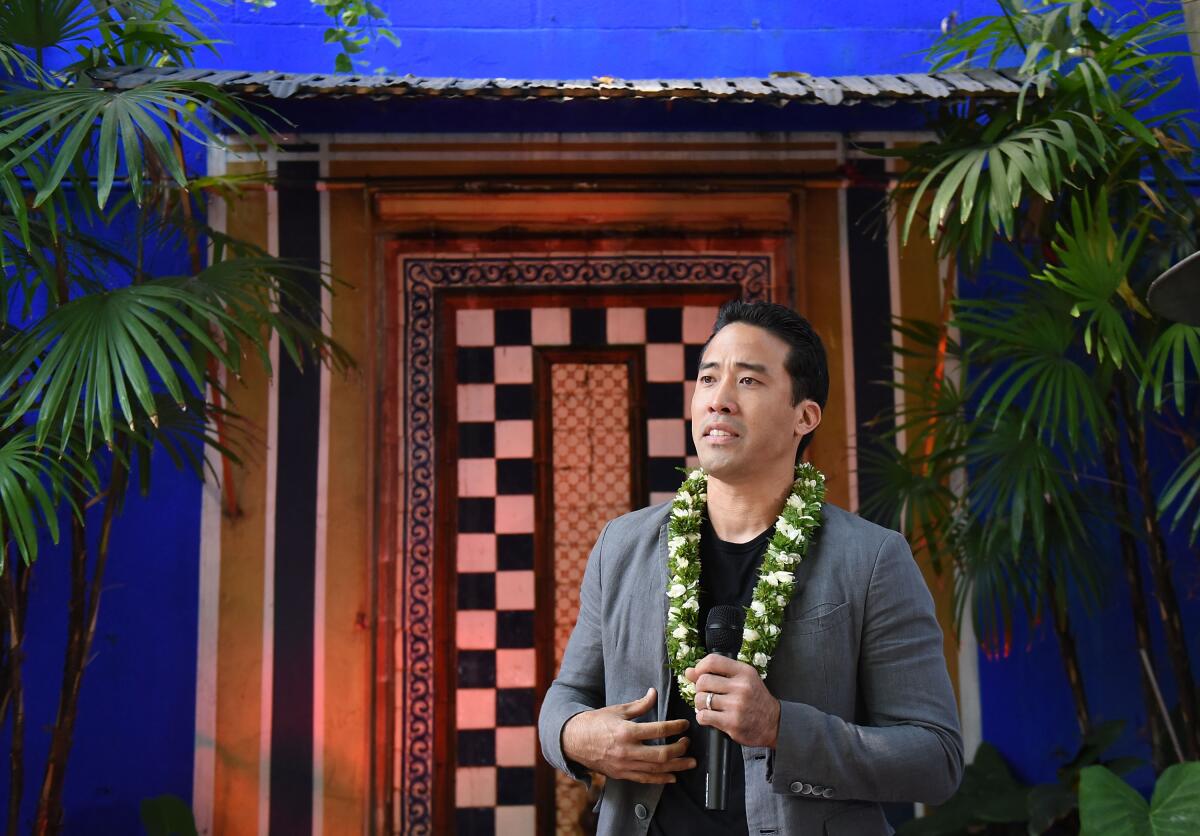Column: L.A. animal rights advocate peddled pandemic snake oil, FTC says

Marc Ching is founder of the Animal Hope & Wellness Foundation, which focuses on rescuing abused dogs and cats. He runs the PetStaurant, a purveyor of natural healing products for critters, with stores in Sherman Oaks and West Los Angeles.
And according to the Federal Trade Commission, Ching, 41, has been illegally selling an herbal supplement he claimed could treat COVID-19.
Not just that. He was accused by the FTC of making unsubstantiated claims that several other products sold by his Sherman Oaks supplements company, Whole Leaf Organics, can treat cancer.
These latter products feature CBD, or cannabidiol, a compound in marijuana that doesn’t get you high but is said to have unproven health benefits.
Ching agreed this week to a preliminary order from the FTC barring him from claiming any product sold by his company “treats, prevents or reduces the risk of COVID-19; or treats cancer; or cures, mitigates or treats any disease.”
Mitch Katz, an FTC spokesman, told me the settlement represents the agency’s “first formal law enforcement action” involving a purported COVID-19 treatment.
However, he noted that “more than 30 warning letters” have been sent to companies selling similarly questionable remedies.
“There’s no proof that any product will prevent or treat COVID-19 or that any CBD product will treat cancer,” said Andrew Smith, who heads the FTC’s Bureau of Consumer Protection.
“Let’s be clear,” he said, “companies making these claims can look forward to an FTC lawsuit like this one.”
The FTC’s agreement with Ching stipulates that he “has not admitted to liability” regarding the claims and that the settlement isn’t an admission he “engaged in violations of the FTC Act or any law or regulation.”
I reached Ching by phone after the settlement was announced. He expressed willingness to discuss the matter but said he was busy. He told me to call back in a few hours.
I did so, repeatedly. No answer.
Ching finally sent me a short email saying we wouldn’t be speaking after all.
He said that, regarding the FTC settlement, “we made a mention to one of our supplements in regards to boosting the immune system. We did not say that it will or can cure, treat or stop COVID-19.”
Ching added that he and Whole Leaf Organics have cooperated with the FTC “in everything they have asked to make sure we are in full compliance.”
The FTC’s original complaint, meanwhile, paints a damning picture of Ching’s marketing practices.
It says that beginning in March, Whole Leaf Organics started claiming that a supplement called Thrive “treats, prevents or reduces the risk of COVID-19.”
It also says the company “represented that the benefits of Thrive are clinically or scientifically proven. In fact, there is no competent and reliable scientific evidence that Thrive or any of its ingredients treats, prevents or reduces the risk of COVID-19.”
The complaint includes a screenshot from the Whole Leaf Organics website touting Thrive as “the perfect way to strengthen your immunity against pathogens like COVID-19, the coronavirus,” with that last bit in bold.
I asked Ching by email how this squares with his insistence to me that his company never said Thrive “can cure, treat or stop COVID-19.” He didn’t respond.
The Whole Leaf Organics site now says Thrive, which is on sale for $36.99, is “formulated containing 16 hand-selected herbal extract strains” and “offers immune support that may assist the body in promoting increased health.”
The FTC complaint says Ching also marketed several CBD products that purportedly “provide extraordinary health benefits” and “treat cancer.”
A screenshot included in the complaint pitches one of the CBD products, CBD-EX, as “the most effective innovation in cancer and immune related proactive supplement support in the past ten years.”
According to the FTC, “there are no competent and reliable human clinical trials ... to substantiate the advertised health claims for these products.”
It’s unfortunate that Ching didn’t want to be interviewed, because he’s clearly an interesting person. His foundation’s advocacy on behalf of animals goes back nearly a decade.
His activities have garnered support from some of the biggest names in Hollywood, including Matt Damon and Joaquin Phoenix, who participated in a 2016 video condemning the grisly practice of butchering dogs for food in China.
However, a rescue mission to the Chinese city of Yulin undertaken by Ching that year landed him in hot water after critics said hundreds of dogs he rescued ended up dead.
The South China Morning Post ran a lengthy story reporting that after Ching saved about 1,000 dogs from being slaughtered, “two-thirds of the animals were paid for by two Buddhist organizations, which took the animals off to their own sanctuaries.”
“Unknown to Ching,” it said, “those dogs were fed and watered but denied lifesaving injections and medical treatment because of Buddhist beliefs. As a result, many of the already sick animals died of distemper and other diseases within days.”
Ching told the paper that the goal of his trip had been to close down slaughterhouses, not save dogs. Although he acknowledged that hundreds of rescued dogs ended up dead, he said he at least gave them a chance at survival.
I can’t speak to that, but I unequivocally support all efforts to prevent the mistreatment of our furry friends.
As for dubious COVID-19 cures, including one I recently wrote about involving “quantum” energy that supposedly breaks down pathogens, enough already.
The last thing we need are scientifically uncertain solutions for a scary problem (yes, looking at you too, Mr. President).
It shouldn’t have taken an FTC order to make Ching do the right thing. Even well-intentioned businesspeople should know better.
More to Read
Inside the business of entertainment
The Wide Shot brings you news, analysis and insights on everything from streaming wars to production — and what it all means for the future.
You may occasionally receive promotional content from the Los Angeles Times.











